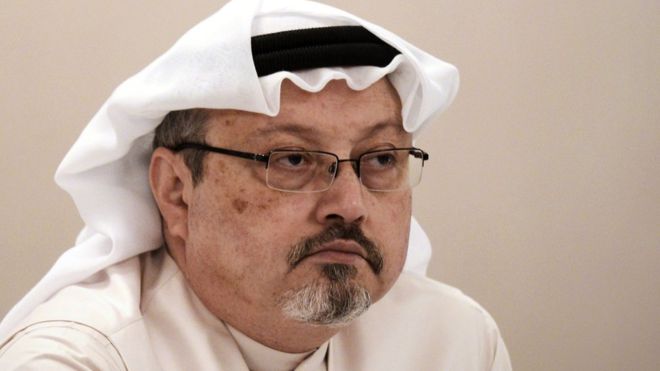
BBC (23 December 2019)- A court in Saudi Arabia has sentenced five people to death and jailed three others over the murder of the journalist Jamal Khashoggi last year.
Khashoggi, a prominent critic of the Saudi government, was killed inside the kingdom’s consulate in the Turkish city of Istanbul by a team of Saudi agents.
The Saudi authorities said it was the result of a “rogue operation” and put 11 unnamed individuals on trial.
A UN expert has concluded that it was an “extrajudicial execution”.
Special Rapporteur Agnes Callamard said in June that there was credible evidence warranting further investigation that high-level Saudi officials, including Crown Prince Mohammed bin Salman, were individually liable for Khashoggi’s death.
- The secret tapes of Jamal Khashoggi’s murder
- Mohammed bin Salman: The man who controls Saudi Arabia
- Jamal Khashoggi: All you need to know about his death
The prince denied any involvement, but in October he said he took “full responsibility as a leader in Saudi Arabia, especially since it was committed by individuals working for the Saudi government”.
A senior aide, Saud al-Qahtani, was sacked and investigated over the killing but not charged “due to insufficient evidence”, the public prosecution said. Former Deputy Intelligence Chief Ahmad Asiri was put on trial but acquitted on the same grounds.
Following Monday’s announcement Ms Callamard wrote on Twitter: “And the travesty of investigation, prosecution and justice continues.”
How did Jamal Khashoggi die?
The 59-year-old journalist, a US-based columnist for the Washington Post, was last seen entering the Saudi consulate on 2 October 2018 to obtain papers he needed to marry his fiancée Hatice Cengiz.
After listening to purported audio recordings of conversations inside the consulate made by Turkish intelligence, Ms Callamard concluded that Khashoggi was “brutally slain” that day.

Saudi Arabia’s deputy public prosecutor Shalaan Shalaan told reporters in November 2018 that the murder was ordered by the head of a “negotiations team” sent to Istanbul by the Saudi deputy intelligence chief to bring Khashoggi back to the kingdom “by means of persuasion” or, if that failed, “by force”.
Investigators concluded that Khashoggi was forcibly restrained after a struggle and injected with a large amount of a drug, resulting in an overdose that led to his death, Mr Shalaan said. His body was then dismembered and handed over to a local “collaborator” outside the consulate, he added. The remains were not found.
At a news conference in Riyadh on Monday, Mr Shaalan said the public prosecution’s investigations had shown that “there was no premeditation to kill at the beginning of the mission”.

“The killing was in the spur of the moment, when the head of the negotiating team inspected the premises of the consulate and realised that it was impossible to move the victim to a safe place to resume… negotiations.
“The head of the negotiating team and the perpetrators then discussed and agreed to kill the victim inside the consulate,” he added.
Who was put on trial?
A statement by the Saudi public prosecution said a total of 31 individuals were investigated over the killing and that 21 of them were arrested. Eleven were eventually referred to trial at the Riyadh Criminal Court and the public prosecutor sought the death penalty for five of them.
Human Rights Watch said the trial, which took place behind closed doors, did not meet international standards and that the Saudi authorities had “obstructed meaningful accountability”.

On Monday, the Riyadh Criminal Court sentenced five individuals to death for “committing and directly participating in the murder of the victim”, according to the public prosecution’s statement.
Three others were handed prison sentences totalling 24 years for “covering up this crime and violating the law”, while the remaining three were found not guilty.
The public prosecution said it would decide whether to review the court’s rulings and decide whether to appeal. The death sentences must be upheld by the Court of Appeal and the Supreme Court.

Ms Callamard said in June that the five people facing the death penalty were Fahad Shabib Albalawi; Turki Muserref Alshehri; Waleed Abdullah Alshehri; Maher Abdulaziz Mutreb, an intelligence officer who the US said worked for Mr Qahtani; and Dr Salah Mohammed Tubaigy, a forensic doctor with the interior ministry.
The other six defendants were Mr Asiri, Mansour Othman Abahussain; Mohammed Saad Alzahrani; Mustafa Mohammed Almadani; Saif Saad Alqahtani; Muflih Shaya Almuslih, reportedly a member of the consulate staff.
According Ms Callamard, the defendants’ lawyers argued in court that they were state employees and could not object to the orders of their superiors.
Mr Asiri reportedly insisted that he never authorised the use of force to bring Khashoggi back to Saudi Arabia.

